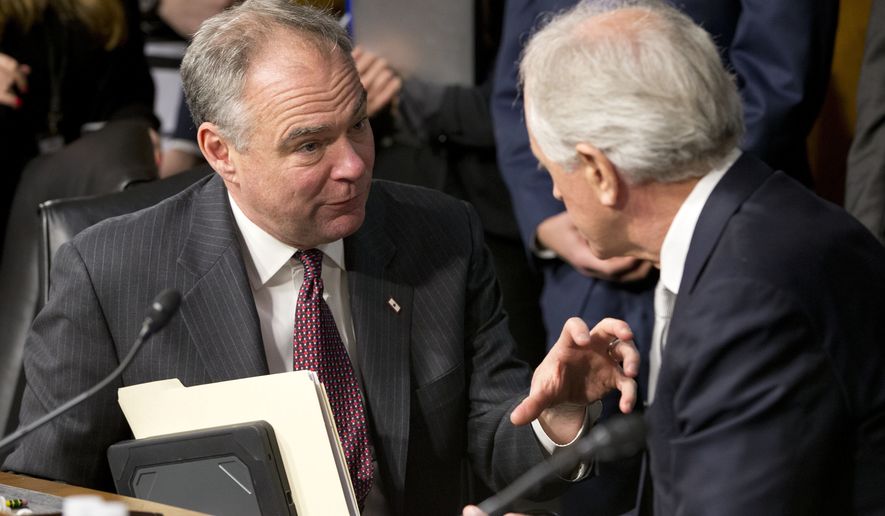U.S. troops could continue fighting the Taliban and al Qaeda and would be given explicit new permission to battle the Islamic State — but would not be authorized to attack the capabilities of any nation state, such as Syria — under updated rules of war proposed by a bipartisan group of senators Monday.
Led by Sen. Bob Corker, chairman of the Foreign Relations Committee, the new Authorization for the Use of Military Force would replace 2001 and 2002 AUMFs that started the war on terror and paved the way for the 2003 invasion of Iraq.
The commander in chief — in this case President Trump — would be authorized to keep up the fight against a long list of international terrorist organizations that were either affiliated with or spun off of al Qaeda, including the Haqqani Network, al-Shabab and the Al Nusrah Front.
But Congress would be granted more oversight powers, including having to reauthorize the war powers every four years.
More than two-thirds of lawmakers now sitting in Congress weren’t there in 2001 when the first authorization was approved in the days after the Sept. 11, 2001, attacks.
That includes Mr. Corker, who said his committee has been trying to come up with a rewrite since at least 2013, and Sen. Tim Kaine, a Virginia Democrat who was his party’s 2016 vice presidential nominee.
“We’ve let the 9/11 and Iraq War authorizations get stretched to justify wars against multiple terrorist groups in over a dozen countries, from Niger to the Philippines,” Mr. Kaine said. “Our proposal finally repeals those authorizations and makes Congress do its job by weighing in on where, when, and with who we are at war.”
The new resolution comes just days after Mr. Trump ordered airstrikes on Syrian chemical weapons facilities.
That decision has sparked a fierce debate in Washington about whether the president had legal authority to approve the strikes without first coming to Congress.
The administration has offered competing explanations. Mr. Trump said he had inherent powers as commander in chief to protect “vital” national security interests. But his CIA director last week said the strikes would be done under the 2001 AUMF authorizing war against the Taliban and al Qaeda.
Sen. Mike Lee, Utah Republican, said Monday that “no president of the United States, no matter party or political ideology, has the authority to unilaterally start a war.”
Monday’s proposal does not appear to give authorization for strikes like last week’s.
After years of prodding from some members of Congress, President Obama had sent up his own AUMF proposal in 2015. The chief aim of that plan was to explicitly authorize the fight against the Islamic State. The administration had been waging the fight under the 2001 AUMF, but many lawmakers on Capitol Hill said that was a stretch.
Once Mr. Obama submitted his plan, though, Congress fractured. Some lawmakers said it was still too expansive in its view of war, while others — chiefly GOP war hawks — said by limiting the use of ground troops it unfairly tied the military and future presidents’ hands.
No action was taken.
It’s not clear whether the new bipartisan effort can clear Congress, but Mr. Corker has promised a debate in committee.
• Stephen Dinan can be reached at sdinan@washingtontimes.com.




Please read our comment policy before commenting.